This is something I never thought about, having never consumed much fish oil:
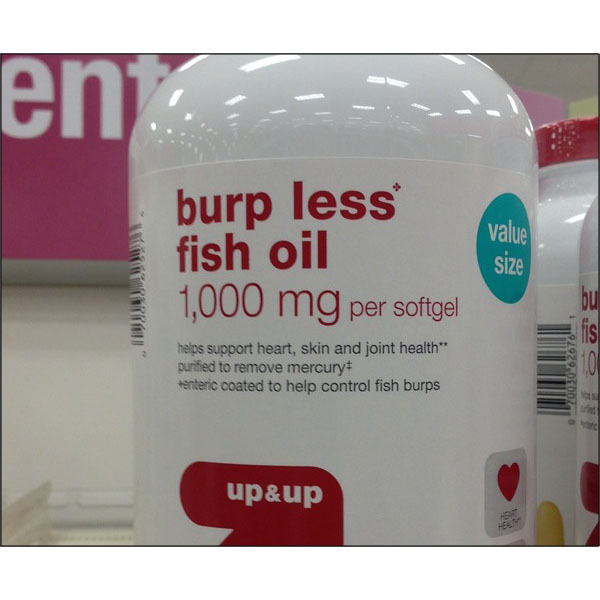
If you consume fish oil, and I do not, then the term "fish burps" need not be explained, and the fact that "fish burps" can be controlled is good news.
There is a variety of fish oil sold by Target that does not include "fish burp" control. I wonder why anyone would buy it.

I was unaware that Gawker had a site devoted to “Domesticity,” and it’s just as bossy and judgmental as I expected. Not “life hacks,” to use an annoying term, but instructions on how you, meaning everyone, or least at the Very Special Stratum of Gawker readers, should rearrange their lives to conform to the whims, preferences, fads, and sudden piercing insights of the writers.
For example: Your Giant American Fridge is making you Fat and Poor. Demonstrably untrue, but it does swivel heads, and provides a jolt of anticipation for those who want to read someone give the business to A) Americans, B) Fat Americans, C) People who have appliances that are bigger, or more powerful, than they need to be; D) Fat American People who are too stupid to realize that modern society is making them poor because they have bought into a stupid system that needs to be remade but if it doesn’t that’s okay because screw ‘em.
The article’s point: you don’t need a big fridge. They consume too much electricity. You should shop more often, which means you will eat better. You should have a European-style fridge and you shouldn’t live anyplace where you can’t bike to the store, anyway. The comments run about 7-3 in favor of YESYES LESS LESS which is fine if that’s what you choose, but it’s not a matter of choice if people don’t choose what they should be choosing. Then it’s a matter of “you live in an effing suburb with your effing brats and eat your effing processed swill” and so on. Says one comment:
Welcome to Gawker. We use profanity here.
How very special of you.
One of my favorites bemoans the lack of 18 cubic foot fridges:
So those are your choices. You can get a big 26 CF monster with all the bells and whistles (and an Energy Star sticker on the door), or you can get a small, cheap, oftentimes ugly as hell fridge that barely meets EPA energy consumption standards. There is no middle, and there certainly are no medium sized, let alone small, refrigerators that we empty-nesters would love to buy if only they were available.
We live in the capitalist equivalent of the Soviet Union now. You take what the Man wants to sell you, or you do without.
The annals of Gawker comments, "The capitalist equivalent of the Soviet Union" is a keeper.
I read a lot of political threads, alas, and if there’s a constant, it’s what people ought to think. Such things are not subject to legislation, and must be assumed, willingly, by people who decide what they believe. The Gawker threads and sites with inordinate devotion to worrying about people who do not live in small apartments in the middle of a city are all about how people ought to act. And these actions should be virtuous. If you shop three times a week and make your own meals from the Farmer’s Market you are virtuous. If you want to freeze large amounts of meat you might be virtuous, if it’s a thrift thing, penny-pinchers being accorded a certain virtue although they’re also kinda weirdoes in this world (unless it’s a site exclusively about penny-pinching, and then it’s a regular fashion parade of hair-shirts). If you castigate other people’s lifestyles for their excesses - a standard determined by “more than what you would want” - then you are virtuous by virtue of criticizing the Great Wobbly-Arsed Mass that pullulates in a numberless horde beyond the thin crust of enlightenment that clings to the coasts.
Most of these people would be perfectly content if people had fewer choices, the comment above excepted; this would hasten Virtue. If big fridges were made them less popular by way of tariffs and fees, they would applaud. If t housing codes were tweaked to reduce the size of new kitchens, they would be ecstatic. If regs and taxes made it more difficult for people to live the lives they wanted to lead, and if those lives were predicated on things like “driving to the store for ice cream if you get the urge,” the right-minded folk would be glad, because they live small cramped lives in small cramped structures where the car alarms go off at 3 AM, and their only compensation is knowing they could probably get ice cream at the place down the street, which is open all night, but to be honest it’s a drag because the guy sits there behind the plexiglass and glares at you and the ice cream sometimes, you know, has crystals in it. (They wrote about this guy in a Gawker comment thread about Worst Store Clerks and it was funny even though it got a little racist but hell those people sometimes.)
Anyway there’s a new place opening a few blocks away that has that new French-style creamed yogurt, it’s so thick it might as well be ice cream, and that’s why we live in the city! Although it’s nine dollars a cup and once the Times writes it up everyone will go and it’ll be ruined. Effing people.
Eff-fing people.
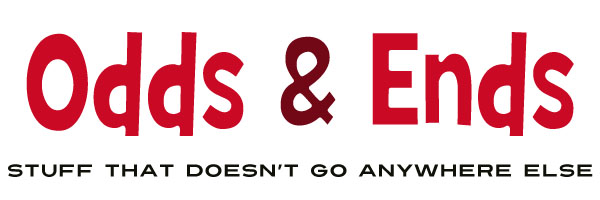
Yes, that magical catch-all for stuff that could probably go here or here, but you’ll take it and you’ll like it. By the way, did anyone who was ever told that he would take it and like it actually like it?
The reasons for this will be apparent tomorrow.
Below: Joe E. Brown. From all accounts, the real deal - not an angry, shallow man who pushed laffs to mask his own inadequacies as a human being, but a genuinely nice guy who gave a lot, and deserved his rep as an ambassador of amiability. But this isn’t about him. It’s about the greeting cards, and how they’ve changed.
It’s National Smile Week! Other other 51 you can glower.

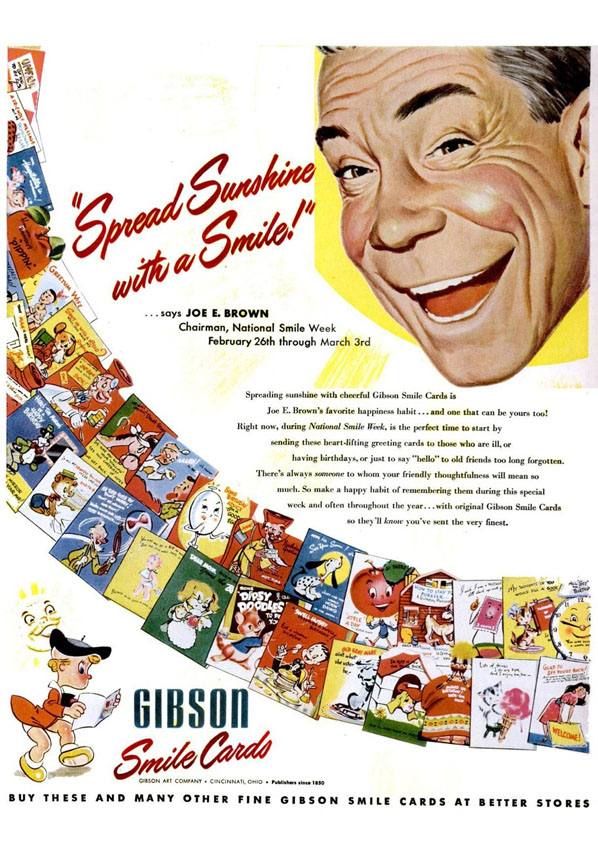
This is from Gibson, if you're curious:
Gibson Greeting's history can be traced to 1850, when George Gibson and his family emigrated to the United States from Scotland, where Gibson had operated a lithographic and copperplate engraving business. The family journeyed to the "land of opportunity" with a small French-made lithography press. While Gibson, his wife, and daughters eventually settled in St. Louis, one of Gibson's five sons found work with a canal system that led him to Cincinnati. His three brothers followed and decided they would go into business using the small press.
What, did he slip off the bank and get carried away to Cincinnati? Don’t laugh; happened to a future president.
As a teenager in 1847, James Garfield worked as a Hoggee, driving mules to pull barges along the canal. After repeatedly falling into the canal on the job, Garfield became ill, and decided to go to college instead.
Anyway, the company’s story is rather dull. They started making cards, made money at it, made more cards, and continued until the 1990s, when they suddenly seemed snakebit. Bad investments. Bad financial decisions. Didn’t help when a couple of chains that sold a lot of their cards went under. Then Wal-Mart said “we’re going to phase you out, alas,” and so on and so on until Kaput City. American Greetings bought the company, and that’s where the brand lives on.
The cards. Did an extreeeeme closeup on the samples. It’s as if they had but one artist, who turned out a card a day. Yesterday, I did a character looking at the reader sideways. Today I’ll do one where he’s looking straight at you. Hope I get a clock or a cat tomorrow.
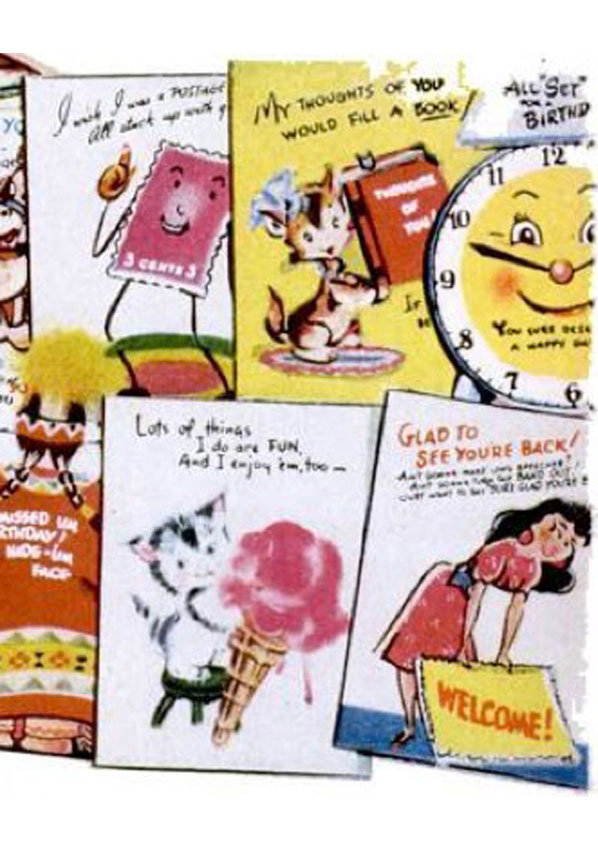
You can almost make out the rhymes, which have remained simple and sing-songy - doggerel for everyday occasions.
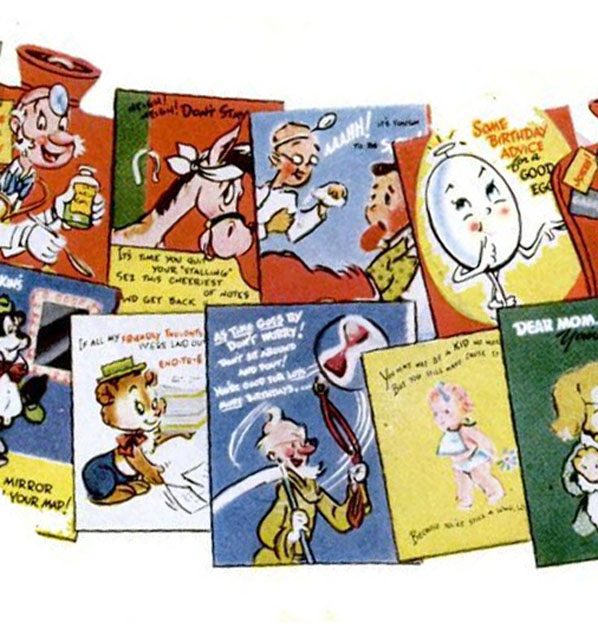 These things probably have their fans, and no doubt there are collectors; who am I to wonder why anyone would want them? But . . . These things probably have their fans, and no doubt there are collectors; who am I to wonder why anyone would want them? But . . .
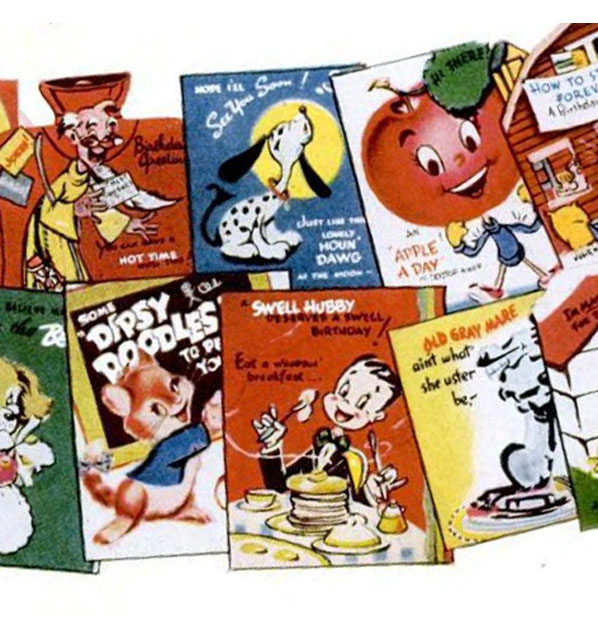
. . . to me they are the most uninteresting things in the world. They look so generic and banal to modern eyes that whatever heartwarming kitsch value they had seems so remote as to be indiscernible. They got saved, though. Mothers saved them, for the most part. They went in a back drawer with a selection of other cards that meant something because they were from a child, or a sweetheart, or were stork-related. The ones that end up in thrift stores are always so damned sad; little happy puppies, 40s-style kids, the aforementioned storks; a message inside in the Uniform Handwriting of Women Born in the Twenties, and a signature completely severed from its owner and the story behind it.
So you should throw away your cards.
You first. I can’t. I saved every Father’s Day card. One of the first has been sitting on my desk for almost ten years.
They’re just folded sheets of paper, mass-marketed, calibrated to stick a hook in your heart. Most can be easily extracted. A few you never want to pull out.


Work blog around 12:30, Tumblr around noonish or so - see you then! And of course, this week's Motels.

|